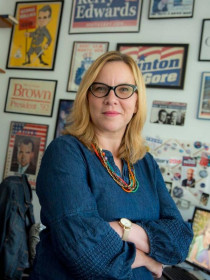
J. Celeste Lay
Connect with J. Celeste
About J. Celeste
Lay studies political socialization, voting behavior and education policy in the United States. Within political science, her recent work has examined the reactions of natives, including adolescents, to immigration in small communities, as well as how gender differences vary across places with regard to socialization and voting in local elections. Her public policy interests focus on the New Orleans education system in particular and education issues more broadly. At Tulane University, she also created and directs the Summer Minor Program in U.S. Public Policy.
Contributions
In the News
Publications
Shows that in spite of claims about the effectiveness of small schools in encouraging involvement, there is limited evidence that they are associated with adolescents’ levels of school participation or volunteerism.
Shows that the paradox of high rural civic participation in spite of high levels of poverty is due largely to the nature of social interaction within smaller towns. Political discussion has positive effects on political knowledge in rural areas, but is negatively associated with knowledge in urban areas.